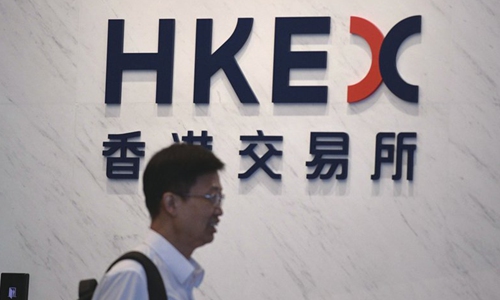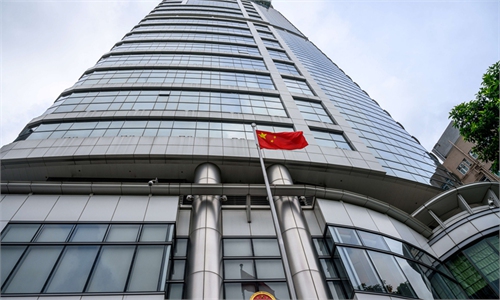Chinese mainland, Hong Kong expand financial cooperation with Swap and ETF connects

HKEX File Photo
In a sign of deepening financial cooperation between the Chinese mainland and the Hong Kong Special Administrative Region (HKSAR) amid the 25th anniversary of Hong Kong's return to the motherland, financial authorities from both sides jointly announced the launch of a Swap Connect on Monday, while the inclusion of exchange-traded funds (ETFs) in the Stock Connect takes effect on the same day.
The strengthened connectivity between financial mechanisms in the mainland and Hong Kong will not only promote mainland capital market reforms for higher-level opening up, but it will cement Hong Kong's status as an international financial center.
On Monday, the inclusion of ETFs in the stock connect program between the mainland and Hong Kong officially took effect. Under the new trade scheme, a total of 87 ETFs, including 83 mainland-listed ETFs and four Hong Kong-based ETFs, can be traded by qualified investors in the two regions.
Experts stressed that the inclusion of ETFs in the stock connect program is another step of deepening reforms that will help push co-development between mainland and Hong Kong financial markets.
"For the Hong Kong stock market, which is the listing home of most mainland internet companies, it has relatively strong vitality and investment values. For the A-share market, ETF connectivity provides a convenient channel for overseas capital to invest in mainland assets, and the mechanism will hopefully attract more overseas capital to participate in such investment," Chen Li, chief economist at Chuancai Securities, told the Global Times on Monday.
Christina Choi, executive director for investment products at the Securities and Futures Commission, Hong Kong's market watchdog, also called the ETF connect an "important milestone" because it signifies another connect program beyond the trading of stocks for the first time, while stressing that the mechanism will broaden the investor base for HK/mainland ETF markets, spur demand and boost capital liquidity, a report from the South China Morning Post noted.
Li Daxiao, chief economist at Shenzhen-based Yingda Securities, said that foreign capital should prefer mainland ETFs tracking large-cap value stocks with high dividend yields, such as SSE 50 Index and CSI 300.
Apart from ETF inclusion, the People's Bank of China, the Hong Kong Securities and Futures Commission and the Hong Kong Monetary Authority (HKMA) also jointly announced the Swap Connect - a new initiative facilitating mutual access between interest rate swap markets in Hong Kong and the mainland, providing a convenient and secure channel for overseas investors to trade interest rate swap products in the mainland.
Li Bing, head of APAC at Bloomberg, said in a note sent to the Global Times on Monday that while those swaps function primarily as an instrument for risk management and portfolio diversification, this initiative opens significant new possibilities for a variety of derivatives that will unleash more foreign participation in China's bond market.
It also creates an opportunity for onshore market makers to elevate their service, which ultimately advances China's financial markets. For Hong Kong, it will help strengthen its unique position as the international gateway to onshore markets, Li said.
The relevant infrastructure institutions in Hong Kong and the mainland will actively take forward the development work, with a view to launching the program in six months.
The two reforms are signs of the mainland and HK to speed up the pace of financial connectivity reforms, after the two regions launched a series of mechanisms to connect their financial markets, ranging from the stock connect program to a mechanism allowing mutual bond trading.
The reforms will on the one hand boost the flow of capital between and in the financial markets in the mainland and Hong Kong, while on the other hand will help consolidate Hong Kong's role as an international financial hub, observers told the Global Times.
"The upgraded financial connectivity will drive the sustainable flow of foreign funds into mainland capital markets, especially as the A-share market has become the world's second-largest and the country's economic growth contributes more than 30 percent to the global total," Li at Yingda Securities said.
He noted that the flow of overseas capital into mainland markets is an important reason why the A-share market has achieved "independent performance" while US shares have plunged into a bear market.
"Chinese stocks are expected to continue their V-shape recovery during the second half of the year, as continued inflow of foreign capital, subduing the epidemic situation at home as well as the government's determination to strive for achieving this year's GDP growth target will help reassure investors," Li Daxiao said.
On Monday, about 4.5 billion yuan ($672 million) of capital flowed into mainland markets through the stock connect program.
HKSAR Chief Executive John Lee Ka-chiu said at a forum on Bond Connect on Monday that in the process of Hong Kong's developing into a global financial hub, the city has realized that the country's stable development is the most solid reliance for the city.
"China has walked into a new development phase. To strengthen Hong Kong's role as a global financial center, the city must stay close to the country's needs, make good use of government policies and its own advantages, as well as serve as the intersection of internal and external circulation," he said.



